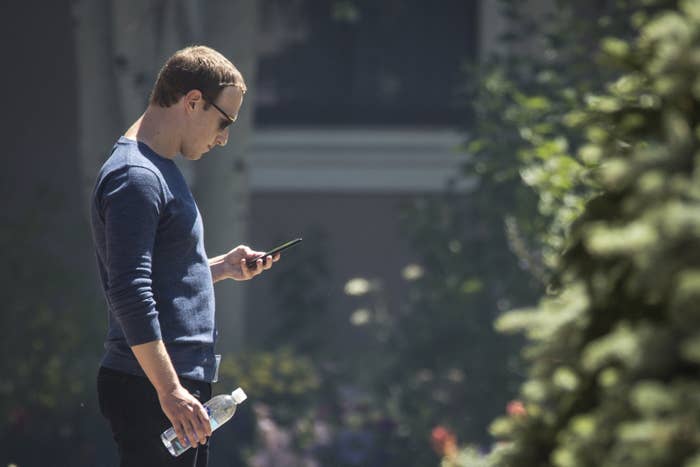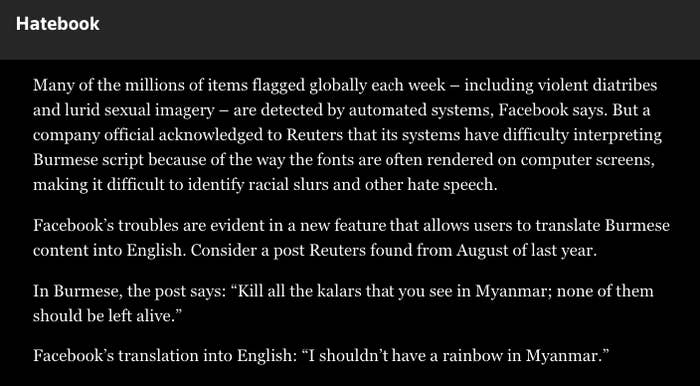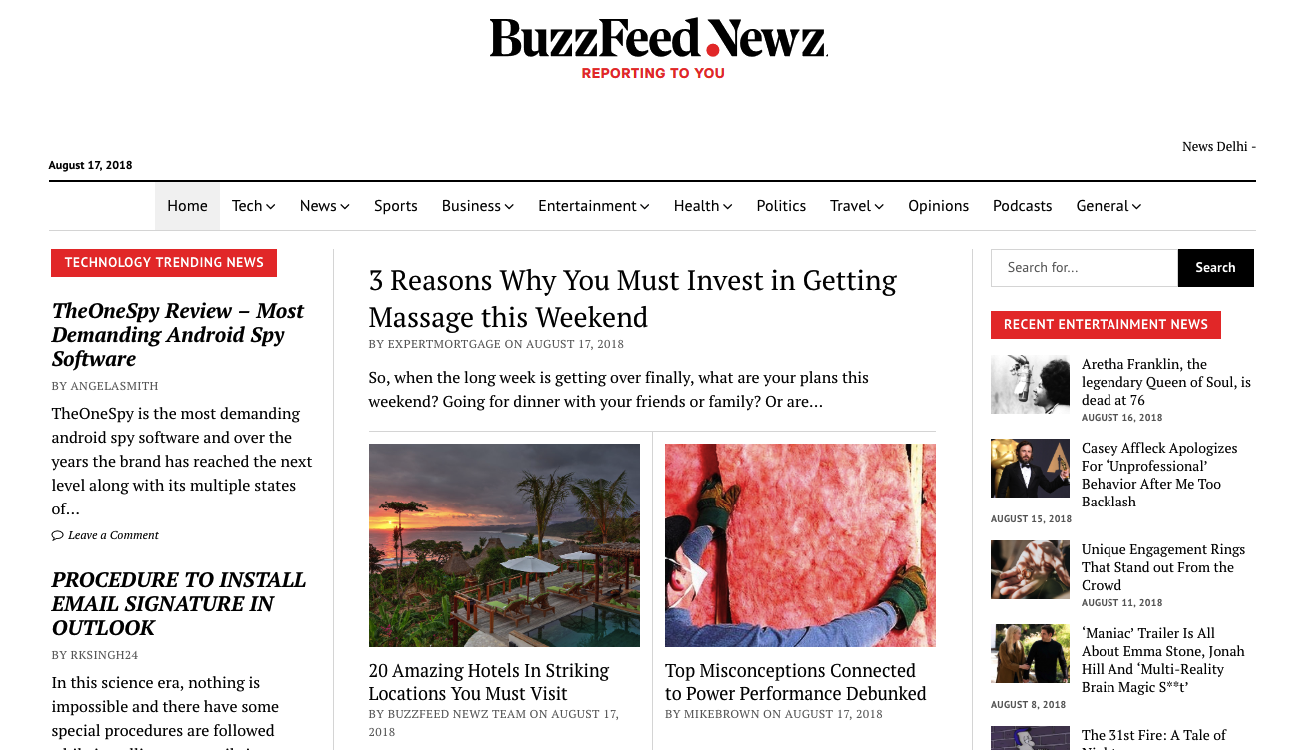
Craig: Jane, I have two quotes for you. Please guess where they came from: “It’s not enough" and "We know we have more work to do."
Jane: The first is me after I finish a large shawarma. The second is Twitter, probably. How did I do?
Craig: Deliciously incorrect. Both are comments from Facebook. Both showed up in articles that detailed how the company failed to take action against people clearly violating its policies after repeated, detailed warnings.
The first came in a devastating Reuters investigation into how the company utterly failed to police hate speech in Myanmar, and how this fed the flames of ethnic cleansing. The second is a quote given to me for my new story about how the company has utterly failed to stop the creation of fake accounts that use photos of military officers.
Admitting failure is better than denying reality. But the breadth and depth of Facebook's failure are remarkable. It's global and has deadly, destructive consequences.
Jane: One thing about Facebook’s Apology Cornucopia is that they rarely acknowledge how long they’ve been aware of problems with their platform.
For example, the deputy head of Ukraine's presidential administration sat down with the company and told them about issues of Russian aggression back in 2014. But the Reuters reporting is even more damning. Facebook use in Myanmar exploded between 2014 and 2016. They added almost 10 million users!!! Reuters reports that Facebook has known about hate speech problems against the Rohingya since 2013. So why has it taken so long to pay attention?
Craig: People have blamed its "move fast and break things" culture, its mission to connect people no matter the costs, and even the lack of a proper humanities education for Zuck.
Here's the truth: The same corporate culture that led to these colossal failures also prevents Facebook from engaging in the kind of deep self-examination that would reveal the answer(s). One of my biggest worries right now is that the company is still not proactive in identifying and tackling abuses fast enough to prevent real harm.
The burden is still on the NGOs, average folks, and other people profiled in these two stories to alert Facebook to what's happening on its platform.
Jane: This isn't just a problem with Facebook. Twitter's Jack Dorsey openly said he relies on journalists to fact-check information on his website. But that's not a solution; it's a Hail Mary.
The tech solution might be what Silicon Valley is used to, but it can't be implemented in isolation. Right now, the tech solution is facilitating people's deaths.

Latest from our team:
- Russian Trolls Swarmed The Charlottesville March — Then Twitter Cracked Down
- YouTube Is Fighting Back Against Climate Misinformation
- Facebook Appears To Have Allowed A Fake News Operation To Publish For Months Before Mexico's Election
- Far-Right Trolls Are Falsely Saying LGBT Activists Want Pedophilia Accepted
- Here’s How Anti-Muslim Groups On Facebook Overlap With A Range Of Far-Right Extremism
- Big Conservative Sites Are Spreading Misinformation About Alleged Voter Fraud In Ohio's Special Election
- This Startup Wants To Sell Verified Breaking News Alerts To Companies
Worth reading:
Jane:Meduza is here to quench your Russian Hacker Thirst with a spy thriller–esque feature about how the country’s hacker recruitment began. If you want to read about youth hacking brigades and “the king of spam,” this is the feature for you.
The Atlantic wrote about “flop accounts” used by teens to discuss, among other things, politics. Many teens who chat on Insta end up veering further right and having a distrust of mainstream media. “You don’t want to read things in a newspaper, because that’s filtered. That’s not interactive,” one teen said. “Flop accounts, you can comment, ask questions, and you usually get replies.” Cool cool cool.
Gizmodo filed this under Adpocalypse Now, which is a terrible pun for a good blog. Bryan Menegus logged all the ads he saw in a day, from bus to smartphone, and tried to figure out how much his attention was worth. Folks, the results are grim for all involved.
Craig:
Ben Collins and Brandy Zadrozny dug deep into the origins of the QAnon conspiracy theory and may have found its creator (though it seems NBC’s lawyers wouldn’t let them say that outright).
There are a lot of people (mostly journalists) who think that Gizmodo’s spring 2016 story about the human curators working for Facebook Trending set off a chain reaction that resulted in Facebook allowing misinformation and partisan garbage to run rampant. Here is the story behind that story, as told by one of its editors. And here is a good Twitter thread on what he might have missed.
A terrifying tale by Kashmir Hill of how a seemingly forgettable online encounter resulted in the total destruction of a woman’s online reputation.
Scammer Shoutout
We just want to give it up for the enterprising “content marketer” in India who registered buzzfeednewz.com and completely copied our new site design. Hey Eric! Cute site! Great logo!


